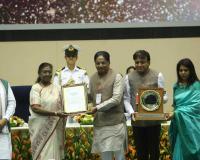Gujarat Government Announces 27% Reservation for OBCs in Local Bodies
Decision Lauded by Party Members and Community Leaders: Surat BJP Celebrates with Fireworks and Sweets

Surat — In a significant move aimed at social equity, the Gujarat state government has announced a 27% reservation for Other Backward Classes (OBCs) in local bodies. The decision, based on a report by the Justice Zaveri Commission, was taken during a cabinet meeting chaired by Chief Minister Bhupendrabhai Patel.
Celebration in Surat
The Bharatiya Janata Party's Surat Metropolitan wing celebrated the decision with much fanfare. Party members burst crackers and distributed sweets at their head office at Pandit Deendayal Bhavan in Udhna.
Surat City President Niranjan Jhanjmera expressed gratitude towards the state government and the Chief Minister for the move. Purneshbhai Modi, an MLA from Surat West Assembly who belongs to the OBC community, elaborated on the importance of the decision. "This move by the Gujarat government and the Chief Minister is truly in public interest and praiseworthy," he said.
Widespread Approval
The announcement was greeted with applause from various quarters, including General Secretary of BJP Surat City Organization, Mukeshbhai Dalal, along with other office bearers, corporators, education committee members, and prominent workers.
"This is a landmark decision that will enable the representation of OBCs in local governance, thereby aligning with the ideals of social justice," said Mukeshbhai Dalal, General Secretary of the BJP Surat City Organization.
Public Interest at Heart
The decision follows the recommendations made by the Justice Zaveri Commission regarding reservation allocation for OBCs in local body institutions. It has been seen as a significant step towards promoting social inclusion and diversity within governmental structures.
While the announcement has garnered widespread approval, especially among OBC communities, it also opens up discussions about the practical implications of the move, including how it will be implemented and its impact on other social groups. Nevertheless, it represents a major step forward in Gujarat's ongoing efforts to ensure social justice and equitable representation in local governance.






